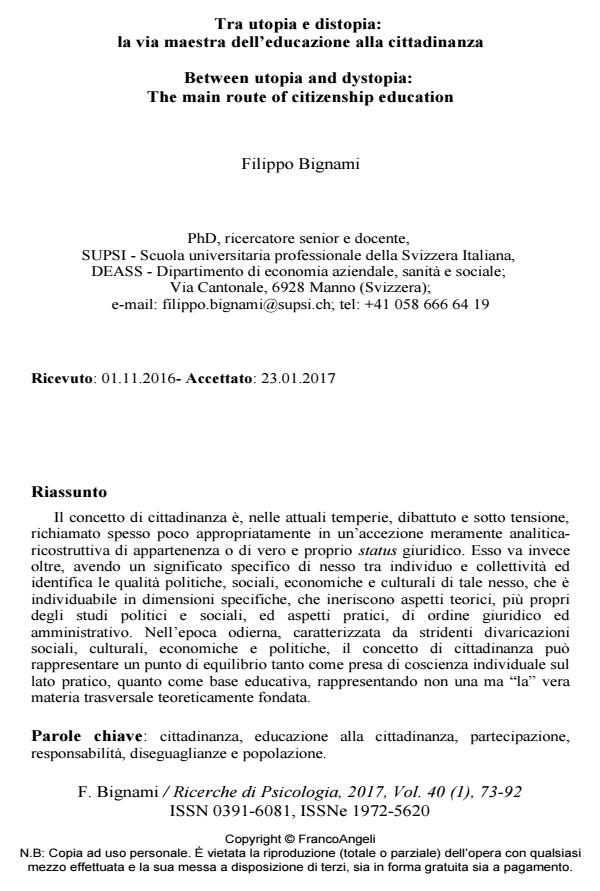Between utopia and dystopia: The main route of citizenship education
Journal title RICERCHE DI PSICOLOGIA
Author/s Filippo Bignami
Publishing Year 2017 Issue 2017/1
Language Italian Pages 20 P. 73-92 File size 262 KB
DOI 10.3280/RIP2017-001004
DOI is like a bar code for intellectual property: to have more infomation
click here
Below, you can see the article first page
If you want to buy this article in PDF format, you can do it, following the instructions to buy download credits

FrancoAngeli is member of Publishers International Linking Association, Inc (PILA), a not-for-profit association which run the CrossRef service enabling links to and from online scholarly content.
The concept of citizenship is nowadays debated and under tension, often called not appropriately in a sense of merely analytical-reconstructive sense, or meaning a legal status. It goes rather beyond, having a specific meaning of nexus between individuals and society and identifies the political, social, economic and cultural characteristics of such a nexus, which is identified in specific dimensions, which are inherent theoretical aspects (coming from political and social studies) and practical aspects (legal and administrative). In the present times, characterized by jarring social, cultural, economic and political divergences, the concept of citizenship can be an equilibrium point either as individual gaining of awareness on the practical side, or as an educational base, representing not one but "the" true cross-cutting subject theoretically established.
Keywords: Citizenship, citizenship education, participation, responsibility, inequalities and population.
- Bignami, F. (2014). How the I-vet project approach to teaching intercultural competences can tie in with the socio-political concept of citizenship. In F. Bignami & M.G. Onorati (eds.), Intercultural Competences for Vocational Education and Training. Experiential Learning and Social Contexts for Enhancing Professional Competences. Milano, Italia: Studi & Ricerche, EGEA.
- Bryson, J.M., Crosby, B.C., & Middleton Stone, M. (2006). The Design and Implementation of Cross-Sector Collaborations: Propositions from the Literature. Public Administration Review, 66(s1), 44-55.
- Costa, P. (2005). Cittadinanza. Roma-Bari: Laterza.
- Dahrendorf, R. (1989). The Modern Social Conflict. An Essay on the Politics of Liberty. New York:Weindelfeld & Nicolson, 1988; trad. It., Il conflitto sociale nella modernità. Saggio sulla politica della libertà, Bari-Roma: Laterza, 1989.
- Elster, J. (1989). The Cement of Society. A Survey of Social Order. Cambridge University press.
- Gallino, L. (2011). Finanzcapitalismo. La civiltà del denaro in crisi. Torino: Einaudi.
- Habermas, J. (1998). L’inclusione dell’altro. Studi di teoria politica. Milano: Feltrinelli.
- Ignatieff, M. (1995). The Myth of Citizenship. In R. Beiner (ed.), Theorizing Citizenship. New York, State University.
- Kampfner, J. (2015). Storia dei ricchi. Dagli schiavi ai super yacht, duemila anni di ineguaglianza. Milano: Feltrinelli.
- Magnette, P. (2005). Citizenship. The history of an idea. Colchester: ECPR Press.
- Marshall, T.H. (1950). Citzenship and Social Class, London, Pluto Press; trad. it. 2002 Cittadinanza e classe sociale. Roma-Bari: Laterza.
- Morin, E., & Kern, A.B. (1993). Terre-Patrie. Paris: Seuil.
- Palma, J.G. (2009). The revenge of the market on the rentiers. Why neo-liberal reports of the end of history turned out to be premature. Cambridge WP n. 0927 in economics, Cambrigde.
- Sassen, S. (2002). Towards post-national and denationalized citizenship. In E. Isin & B. Turner (eds.), Handbook of Citizenship Education (pp. 277-291). London: SAGE.
- Sau, R. (2004). Il paradigma repubblicano. Saggio sul recupero di una tradizione. Milano: FrancoAngeli.
- Smelser, N.J., & Baltes, P.B. (eds.) (2001). International Encyclopedia of the Social and Behavioral Sciences (pp. 1852-1853). Oxford: Elsevier.
- United Nations, Department of Economic and Social Affairs, Population Division (2015). World Population Prospects: The 2015 Revision, Key Findings and Advance Tables. Working Paper No. ESA/P/WP.241.
- Yourcenar, M. (1988). Memorie di Adriano. Torino: Einaudi.
Filippo Bignami, Tra utopia e distopia: la via maestra dell’educazione alla cittadinanza in "RICERCHE DI PSICOLOGIA " 1/2017, pp 73-92, DOI: 10.3280/RIP2017-001004